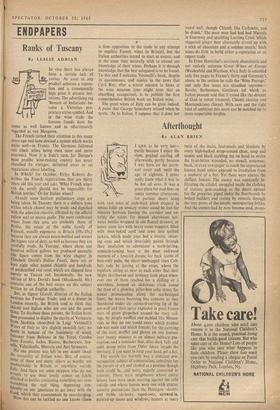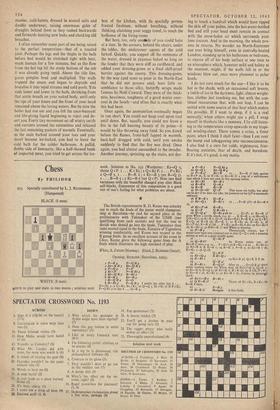Afterthought
By ALAN BRIEN
I LIKE to be very hot— partly because I enjoy the slow, gradual cooling off afterwards, partly because I was born on the north- east coast and, until the age of eighteen, I never really knew what it was to be hot all over. It was a great place for coal fires on
sunny summer afternoons;
for parlour doors hung with vast tents of inch-thick plush drapery in whose folds an unwary visitor could be lost for minutes between leaving the corridor and en- tering the room; for dented aluminium hot- water bottles wrapped in old flannel drawers, or heavy stone jars with heavy stone stoppers, filled with oven-baked sand and sewn into quilted jackets, which made your bed a steamy, sweat- ing cave and which invariably poked through their insulation to administer a teeth-jarring, stomach-turning burn at the most awkward moment of a feverish dream; for back rooms of beer-only pubs, the cidcor unchanged since Cob- bett rode by jeering at the crops, where the regulars, sitting so near to each other that their thighs interleaved and intimacy took place when- ever one of them reached for a shilling or a matchbox, formed an idolatrous circle round the ikon of a glowing, pillar-box coke stove; for winter promenading along the sea-besieged front, the waves booming like cannons as they thundered under the outward-curving lip of the sea-wall and their spray exploded in great frozen stars of green grapeshot around the rusty rail- ings, by people muffled and mobled like Musco- vites so that no one could swear which padded tub was male and which female; for the carrying of the coat, muffler and gloves on any journey over twenty minutes as an almost military pre- caution, and a reminder that, after dusk falls and cold, damp mists from Outer Space invade the territory, if you want to keep your head, get a hat.
The search for warmth was a constant pre- occupation, subject of conversation, substitute for the pursuit of sex and alcohol as a pastime though both could be, and were, eagerly converted in calories. There were neighbours whose entire leisure lives were spent warring against the cold outside and whose houses were run with stricter security precautions than the Pentagon—double and treble air-locks, taped-over, screwed-in, painted-up doors and windows, heaters at every twist of the stairs, foot-stools and blankets by every high-backed wrap-around chair, soup and scones and black scalding tea on hand to revive the frost-bitten wounded, no utensil, ornament, book, or even newspaper to touch the unprotected human hand unless exposed to irradiation from a sunburst of a fire. Yet these were always the chilliest houses. The enemy was constantly in- filtrating the citadel, smuggled inside the clothing of visitors, gate-crashing as the doors opened for the groceries, piped under the floorboards by bribed builders and oozing by osmosis through the very pores of the simple, unsuspecting bricks. And the owners had by now become mad, mono- maniac, cold-haters, dressed in several suits and double underwear, raising enormous gales of draughts behind them as they rushed backwards and forwards hunting new leaks and checking old breaches.
I often remember some part of me being raised to the perfect temperature-that of a roasted joint. Perhaps the legs and the thighs in the bath before bed would be stretched tight with heat, made human for a few minutes, but as the flow from the hot tap hit the steely bottom of the tub it was already going tepid. Above the tide line, goose pimples bred and multiplied. The walls trapped the steam and began to degrade and brutalise it into tepid streams and cold pools. You sank lower and lower in the bath, shrinking from that arctic breath on your naked body, until only the tips of your knees and the front of your head remained above the loving waters. But by now the boiler had run out and you felt the once-buoyant and life-giving liquid beginning to reject and de- sert you. Every tiny movement set off wintry swirls and currents around the extremities and released the last remaining pockets of warmth. Eventually, as the seals barked around your toes and your navel became ice-locked, you had to leave the cold bath for the colder bathroom. A pallid, flabby side of humanity, like a half-thawed hunk of imported meat, you tried to get across the ice-
box of the kitchen, with its specially perma- frosted linoleum, without breathing, without thinking, clutching your soggy towel, to reach the hothouse of the living-room. .
But here, too, only onellide of you could bake at a time. In the corners, behind the chairs, under the tables, the undercover agents of the cold lurked. Quickly, you sopped off the remnants of the water, dressed in pyjamas baked so long on the fender that they were stiff as cardboard, and added your dressing-gown as a final chill-proof barrier against the enemy. This dressing-gown, by the way (and none so poor in the North-East that he did not possess one), bore little re- semblance to those, silky, butterfly wraps made famous by Noel Coward. They were of the thick- neSs, heaviness, toughness of a good winter over- coat in the South-and Often that is exactly what this had been.
Once again, the ammunition eventually began to run short. You could not heap coal upon coal until dawn. But, equally, you could not leave a fire in the full burning beauty of its prime-it would be like throwing away food. So you dozed before the flames, front-half lapped in warmth, back-half drugged with cold, until you awoke suddenly to find that the fire was dead. Once again, you had almost succumbed to the invader. Another journey, sprinting up the stairs, not dar-
SPECTATOR, 'OCTOBER 22, 1965 ing to touch a handrail which would have ripped the skin off your palms, into the hot-water-bottled bed and still your head must remain in contact with the snow-laden air which surrounds your lone cocoon. And in the morning, the whole pro- cess in reverse. No wonder no North-Easterner can ever bring himself, even in centrally-heated London, standing up in his bathroom or bedroom, to expose all of his body surface at one time to an atmosphere which, however mild and balmy at the moment, might, if the walls fell in or the windows blew out, once more plummet to polar levels.
I do not care much for the sun-I like it to be hot in the shade, with an occasional soft breeze, a tinkle of ice in the 4rkness, tight, almost weight- less, clothes just touching me, but with the con- tinual reassurance that, with one leap, I can be united with some source of that heat which makes life possible. If I want to sleep, if it is a real necessity, when others might use a pill, I wrap myself in blankets like a mummy. I lie still listen- ing to the temperature creep upwards in my tropi- cal winding-sheet. There comes a crisis, a fever point, when I think I shall faint-then I am over the hump and tobogganing into unconsciousness. I also find it a cure for colds, nightmares, free- floating anxieties, fear of death, and boredom. If it's hot, it's good, is my motto.































 Previous page
Previous page